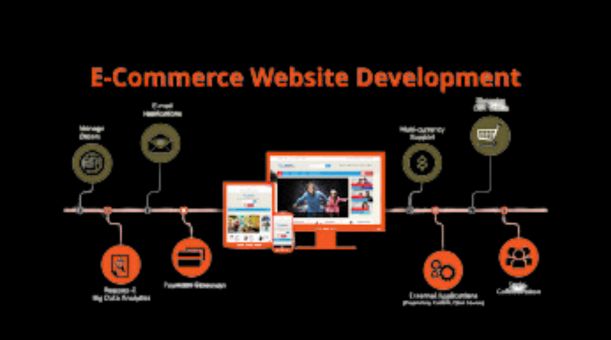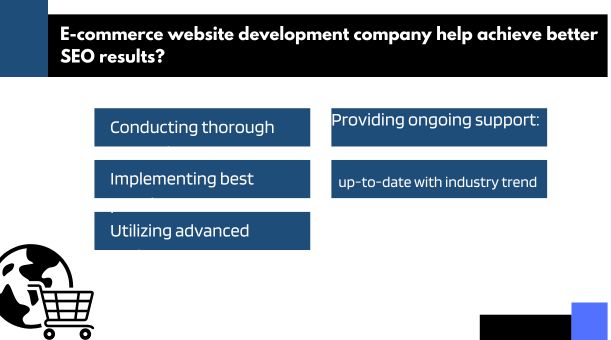As more and more businesses shift their focus towards the online market, e-commerce website development has become a crucial aspect of any successful online business strategy.
This comprehensive guide will explore the key elements of SEO-optimized e-commerce website development in London, including effective design, development, and optimization strategies. By implementing these best practices, businesses can boost their online visibility and sales and stay ahead of the competition in the fast-paced world of e-commerce.
What is E-commerce website development and Why is it important for businesses in London?

E-commerce website development is creating and designing a website that allows businesses to sell products or services online. It involves developing a user-friendly and visually appealing website optimized for search engines and easy to navigate, allowing customers to easily browse products, add them to their cart, and make purchases securely online.
E-commerce website development also typically involves integrating payment gateways, inventory management systems, and order processing systems to streamline the buying process and provide a seamless shopping experience for customers. Overall, e-commerce website development is essential to establishing a successful online business presence in today’s digital age.
Importance:
here are some reasons why e-commerce website development is important for businesses in London:
- Online shopping is becoming increasingly popular, with more and more consumers turning to the internet to purchase products and services.
- E-commerce websites allow businesses to reach a wider audience, both locally and globally, without the constraints of physical location or operating hours.
- E-commerce websites can provide a more cost-effective and efficient way to sell products than traditional brick-and-mortar stores.
- E-commerce websites can be optimized for search engines, allowing businesses to attract more traffic and potentially increase sales.
- London is a highly competitive market, and a well-designed and user-friendly e-commerce website can help businesses stand out.
- With the ongoing COVID-19 pandemic, e-commerce websites have become even more essential for businesses to continue selling products and services while adhering to social distancing guidelines.
What are the key elements to consider when developing an E-commerce website for SEO?
Here are some key elements to consider when developing an e-commerce website for SEO:
- Keyword research: Conduct keyword research to identify relevant and high-traffic keywords to target in your website content.
- Site structure and navigation: Develop a clear and intuitive site structure with easy-to-use navigation that helps users and search engines find and understand your website content.
- Mobile responsiveness: Ensure your website is mobile-friendly, as mobile devices are increasingly used for online shopping.
- Page speed: Optimize your website for fast page load speeds, as slow-loading websites can negatively impact user experience and SEO performance.
- On-page optimization: Optimize website pages, including product pages and category pages, for relevant keywords, meta descriptions, and image tags.
- Content creation: Develop high-quality and engaging content, including product descriptions and blog posts, to attract and engage users and boost SEO performance.
- Social media integration: Integrate social media into your e-commerce website to boost visibility and drive traffic.
- Backlinks: Build high-quality backlinks to your website to improve your website’s authority and boost SEO performance.
- Analytics and tracking: Install analytics and tracking tools to monitor website performance and identify opportunities for improvement.
- Security: Implement strong website security measures to protect user data and build customer trust.
How can a London-based E-commerce website development company help achieve better SEO results?

A London-based e-commerce website development company can help businesses achieve better SEO results by:
Conducting thorough research:
A professional e-commerce website development company will conduct extensive research on your business, industry, and target audience to identify your website’s most effective SEO strategies.
Implementing best practices:
They will implement best practices for e-commerce website development and SEO, including optimizing website design, structure, and content for search engines.
Utilizing advanced tools:
A reputable company will utilize advanced SEO tools and analytics to monitor website performance, identify opportunities for improvement, and implement changes that will boost SEO results.
Providing ongoing support:
They will provide ongoing support and maintenance to ensure your website performs well in search engines and meets your business’s and customers’ evolving needs.
Staying up-to-date with industry trends:
A professional e-commerce website development company will stay up-to-date with the latest industry trends and SEO strategies, ensuring your website remains competitive in the ever-changing online marketplace.
Partnering with a London-based e-commerce website development company can help businesses achieve better SEO results and establish a strong online presence that drives traffic and boosts sales.
How can social media integration enhance the SEO performance of an E-commerce website?
Social media integration can enhance the SEO performance of an e-commerce website in several ways. Firstly, social media platforms such as Facebook, Instagram, and Twitter can drive traffic to the website by promoting products and sharing links to relevant pages. This traffic can then be tracked using analytics tools to monitor engagement and conversion rates.
In addition, social media integration can improve the overall online visibility of the website by providing additional channels for users to find and share content. When users share website links or product pages on social media, this creates valuable backlinks to the website, which can improve the website’s search engine ranking and authority.
Social media integration can also improve customer engagement and satisfaction, which in turn can improve SEO performance. By responding to customer inquiries and reviews on social media, businesses can build trust and credibility with their audience, increasing brand loyalty and positive word-of-mouth referrals.
social media integration is a key component of an effective SEO strategy for e-commerce websites, as it can improve online visibility, drive traffic and engagement, and ultimately lead to increased sales and revenue.
What are the benefits of implementing user reviews and ratings on an E-commerce website for SEO?

here are some benefits of implementing user reviews and ratings on an e-commerce website for SEO:
- User reviews and ratings can encourage users to engage with the website and leave feedback, increasing overall user engagement and time spent on the site.
- User reviews and ratings provide fresh and unique content for search engines to index, which can improve the website’s search engine ranking.
- User reviews and ratings can improve the credibility and trustworthiness of the website, which can lead to increased conversions and customer loyalty.
- User reviews and ratings can provide valuable insights into customer preferences and opinions, which can help businesses improve their product descriptions and marketing messaging.
- By responding to user reviews and ratings, businesses can improve customer satisfaction and address any concerns or issues, leading to positive word-of-mouth referrals and increased sales.
- User reviews and ratings can improve the website’s visibility by providing additional keywords and phrases for search engines to index, improving the website’s search engine ranking and visibility to potential customers.
How can mobile responsiveness impact the SEO of an E-commerce website?
Sure, here are some ways that mobile responsiveness can impact the SEO of an e-commerce website:
- Mobile responsiveness can improve the user experience, leading to increased engagement, time spent on the website, and conversions.
- Mobile responsiveness can improve website speed, a key factor in search engine ranking algorithms.
- Mobile responsiveness can reduce bounce rates by ensuring that the website is easy to navigate and use on mobile devices, which can improve user engagement and time spent on the site.
- Mobile users are more likely to share content on social media, which can improve the visibility and reach of the website.
- Mobile responsiveness is important for local SEO, as mobile users are more likely to search for local businesses and services on their mobile devices.
- Improved search engine ranking: Mobile responsiveness is a key factor in search engine ranking algorithms, and websites that are not mobile responsive may be penalized in search engine rankings
What are the common mistakes to avoid in E-commerce website development that could hurt SEO?
here are some common mistakes to avoid in e-commerce website development that could hurt SEO:
- Poor website structure: A website with a poor structure, such as messy URLs, broken links, and confusing navigation, can negatively impact search engine ranking and user experience.
- Duplicate content: Having duplicate content on your website, such as product descriptions or pages, can lead to penalties and lower search engine rankings.
- Poorly optimized images: Large, unoptimized images can slow down page loading times, negatively impacting search engine ranking and user experience.
- Lack of mobile responsiveness: As mentioned earlier, not having a mobile-responsive website can hurt search engine ranking and user experience.
- Thin or low-quality content: Having thin or low-quality content, such as product descriptions that are too short or lack useful information, can negatively impact search engine ranking and user experience.
- Ignoring meta tags: Ignoring important meta tags, such as title tags and meta descriptions, can hurt search engine ranking and user experience.
- Not having an SSL certificate: Not having an SSL certificate can negatively impact search engine ranking and user trust.
conclusion
developing an e-commerce website with SEO in mind is essential for businesses in London looking to increase their online visibility and drive traffic to their website. When developing an e-commerce website for SEO, key elements include website structure, mobile responsiveness, optimized images, high-quality content, user reviews and ratings, social media integration, and meta tags.
By partnering with a London-based e-commerce website development company, businesses can benefit from their expertise in achieving better SEO results. implementing user reviews and ratings, social media integration and mobile responsiveness can further enhance the SEO performance of an e-commerce website.
businesses should avoid common mistakes such as poor website structure, duplicate content, poorly optimized images, lack of mobile responsiveness, thin or low-quality content, ignoring meta tags, and not having an SSL certificate to maintain good SEO performance and user experience. By implementing these strategies, businesses in London can improve their online presence and drive more traffic and sales to their e-commerce website.
